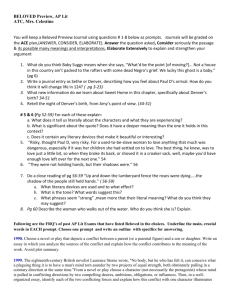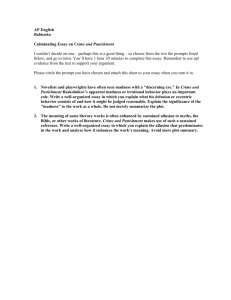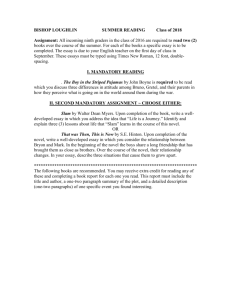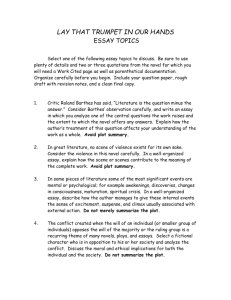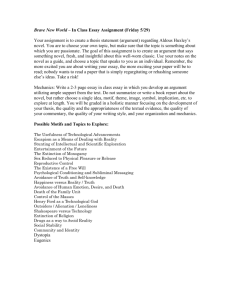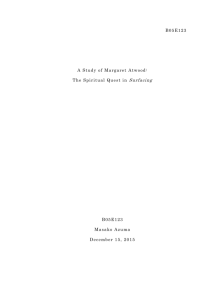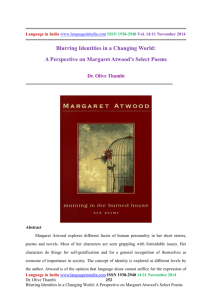Lit Theory Paper Prompts
advertisement
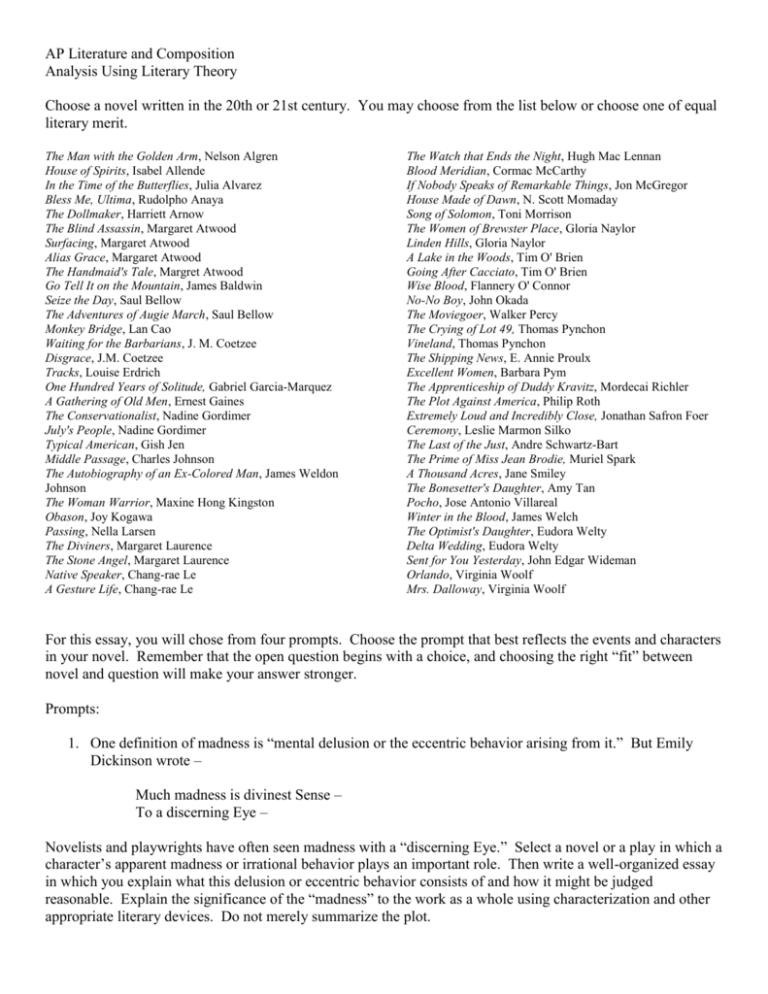
AP Literature and Composition Analysis Using Literary Theory Choose a novel written in the 20th or 21st century. You may choose from the list below or choose one of equal literary merit. The Man with the Golden Arm, Nelson Algren House of Spirits, Isabel Allende In the Time of the Butterflies, Julia Alvarez Bless Me, Ultima, Rudolpho Anaya The Dollmaker, Harriett Arnow The Blind Assassin, Margaret Atwood Surfacing, Margaret Atwood Alias Grace, Margaret Atwood The Handmaid's Tale, Margret Atwood Go Tell It on the Mountain, James Baldwin Seize the Day, Saul Bellow The Adventures of Augie March, Saul Bellow Monkey Bridge, Lan Cao Waiting for the Barbarians, J. M. Coetzee Disgrace, J.M. Coetzee Tracks, Louise Erdrich One Hundred Years of Solitude, Gabriel Garcia-Marquez A Gathering of Old Men, Ernest Gaines The Conservationalist, Nadine Gordimer July's People, Nadine Gordimer Typical American, Gish Jen Middle Passage, Charles Johnson The Autobiography of an Ex-Colored Man, James Weldon Johnson The Woman Warrior, Maxine Hong Kingston Obason, Joy Kogawa Passing, Nella Larsen The Diviners, Margaret Laurence The Stone Angel, Margaret Laurence Native Speaker, Chang-rae Le A Gesture Life, Chang-rae Le The Watch that Ends the Night, Hugh Mac Lennan Blood Meridian, Cormac McCarthy If Nobody Speaks of Remarkable Things, Jon McGregor House Made of Dawn, N. Scott Momaday Song of Solomon, Toni Morrison The Women of Brewster Place, Gloria Naylor Linden Hills, Gloria Naylor A Lake in the Woods, Tim O' Brien Going After Cacciato, Tim O' Brien Wise Blood, Flannery O' Connor No-No Boy, John Okada The Moviegoer, Walker Percy The Crying of Lot 49, Thomas Pynchon Vineland, Thomas Pynchon The Shipping News, E. Annie Proulx Excellent Women, Barbara Pym The Apprenticeship of Duddy Kravitz, Mordecai Richler The Plot Against America, Philip Roth Extremely Loud and Incredibly Close, Jonathan Safron Foer Ceremony, Leslie Marmon Silko The Last of the Just, Andre Schwartz-Bart The Prime of Miss Jean Brodie, Muriel Spark A Thousand Acres, Jane Smiley The Bonesetter's Daughter, Amy Tan Pocho, Jose Antonio Villareal Winter in the Blood, James Welch The Optimist's Daughter, Eudora Welty Delta Wedding, Eudora Welty Sent for You Yesterday, John Edgar Wideman Orlando, Virginia Woolf Mrs. Dalloway, Virginia Woolf For this essay, you will chose from four prompts. Choose the prompt that best reflects the events and characters in your novel. Remember that the open question begins with a choice, and choosing the right “fit” between novel and question will make your answer stronger. Prompts: 1. One definition of madness is “mental delusion or the eccentric behavior arising from it.” But Emily Dickinson wrote – Much madness is divinest Sense – To a discerning Eye – Novelists and playwrights have often seen madness with a “discerning Eye.” Select a novel or a play in which a character’s apparent madness or irrational behavior plays an important role. Then write a well-organized essay in which you explain what this delusion or eccentric behavior consists of and how it might be judged reasonable. Explain the significance of the “madness” to the work as a whole using characterization and other appropriate literary devices. Do not merely summarize the plot. 2. “And after all, our surroundings influence our lives and characters as much as fate, destiny, or any supernatural agency.” –Pauline Hopkins, Contending Forces Choose a novel or a play in which cultural, physical, or geographical surroundings shape psychological or moral traits in a character. Then write a well-organized essay in which you analyze how surroundings affect this character and illuminate the meaning of the work as a whole. “You can leave home all you want, but home will never leave you.” – Sonsyrea Tate Sonsyrea Tate’s statement suggests that “home” may be conceived of as a dwelling, a place, or a state of mind. It may have positive or negative associations, but in either case, it may have considerable influence on an individual. 3. Choose a novel or play in which a central character leaves home yet finds that home remains significant. Write a well-developed essay in which you analyze the importance of “home” to this character and the reasons for its continuing influence. Explain how the character’s idea of home enhanced by the author’s use of literary devices illuminates the larger meaning of the work. 4. In The Writing of Fiction (1925), novelist Edith Wharton states the following. At every stage in the progress of his tale the novelist must rely on what may be called the illuminating incident to reveal and emphasize the inner meanings of each situation. Illuminating incidents are the magic casements of fiction, its vistas on infinity. Choose a novel or play that you have studied and write a well-organized essay in which you describe an “illuminating” episode or moment and explain how it functions as a “casement,” a window that opens onto the meaning of the work as a whole. Avoid mere plot summary. Requirements: 3-4 pages – do not exceed typed, double-spaced MLA format direct quotations from primary source (NO secondary sources allowed, not even cliff or spark or "wiki" anything - this is a test of your abilities) General Rubric: organization: 25 examples and explanation: 100 grammar: 20 format: 5 The detailed rubric/scoring guide is available on my website. Due: Monday, March 30th. You may turn in the paper prior to this date; no late papers will be accepted.


